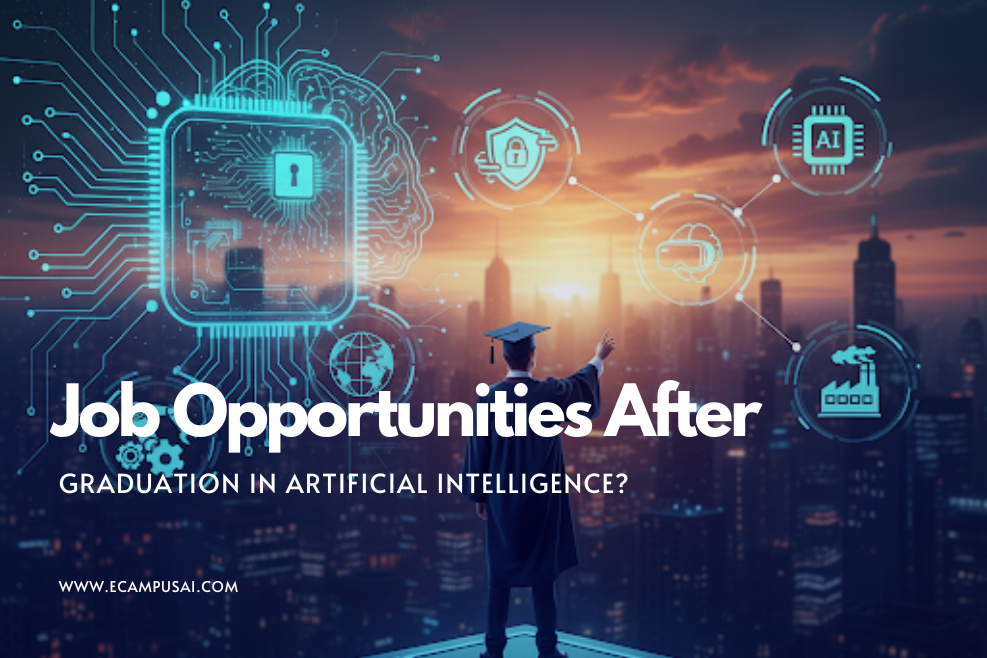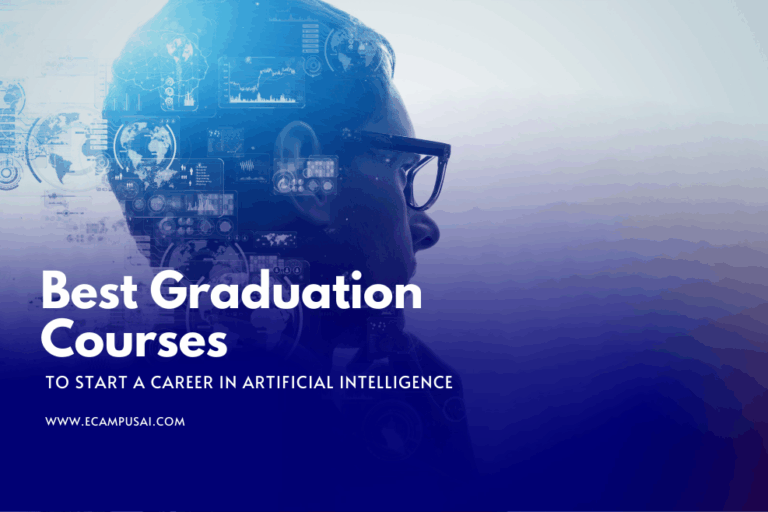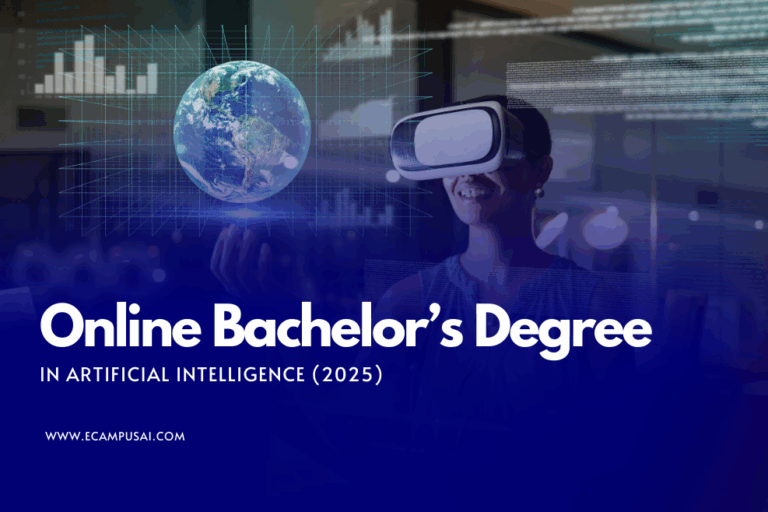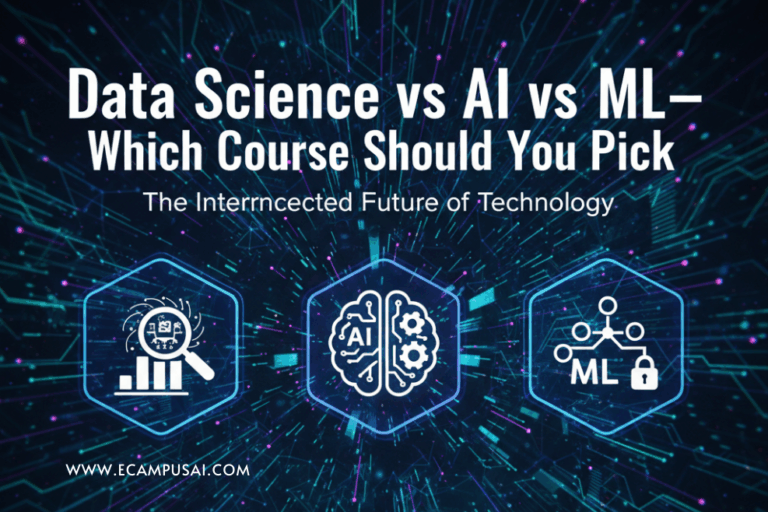Job Opportunities After Graduation in Artificial Intelligence
Ever wondered what happens once you finish your Graduation in Artificial Intelligence? You’ve spent years learning programming, data, and smart systems—but what’s the payoff? Here’s the real question every student asks: What kind of future does this degree actually create?
Stick with me, because the answer may surprise you—it’s not just about coding jobs. AI graduates today are stepping into careers that didn’t even exist ten years ago, and the growth isn’t slowing down anytime soon.
Eligibility for Graduation in Artificial Intelligence
Before we jump into jobs, let’s talk about who can actually pursue a Graduation in AI. Many students (especially diploma holders) wonder if they are eligible, so here’s a clear breakdown:
1. 10+2 Qualification
- Students from the science stream with Mathematics, Physics, or Computer Science as core subjects are preferred.
- A minimum of 50%–60% aggregate marks is usually required.
2. Diploma Holders
- Students with diplomas in Computer Science, IT, or Engineering can often apply for lateral entry directly into the second year of the program.
- Some universities also consider diplomas in Mathematics or Statistics with additional bridge courses.
3. Entrance Exams
- Some universities ask for tests like JEE, CUET, or their own tests.
- Private and online universities sometimes admit students based on merit without entrance exams.
In short: If you are good at tech or science & hit the mark on needs, you can get this degree. It opens great job doors.
Job Opportunities After Graduation in Artificial Intelligence
What everyone actually wants to know after finishing a Graduation in Artificial Intelligence is this: what jobs can you get?
The answer might surprise you. It’s not just coding gigs in tech companies. Hospitals need AI for medical scans, banks rely on it to catch fraud, schools use it for digital learning tools, even transport and entertainment companies are hiring AI experts. The field is way bigger than most people think. Let’s explore the top career paths one by one.
Let’s explore the top career paths one by one.
1. AI Engineer
What They Do:
AI engineers develop and improve intelligent systems that study data, predict, and adapt to new scenarios. They collect answers that recommend structures, scams, and colloquial chatbot equipment.
Where They Work:
- Tech companies (Google, Microsoft, Infosys)
- Banking and finance (HDFC, SBI, JP Morgan)
- Healthcare startups (AI-powered diagnostics and treatment planning)
Skills Required:
- Python, Java, or C++
- Machine learning frameworks like TensorFlow or PyTorch
- Problem-solving and logical thinking
Salary Range (India): ₹6–12 LPA
Career Scope:
AI engineers are in short supply, and demand is only rising. This role is becoming essential for inventions as companies continue to automate.
2. Data Scientist
What They Do:
Data scientists convert raw data into meaningful insights. They clean, treat, and analyze the dataset on a large scale and then offer conclusions to direct business strategies.
Where They Work:
- E-commerce companies like Amazon or Flipkart
- Healthcare research labs
- Financial organizations for the prevention of customer insight and fraud.
Skills Required:
- Strong mathematics and statistics
- Data visualization (Power BI, Tableau)
- Knowledge of SQL and cloud platforms
Salary Range (India): ₹8–14 LPA
Here’s something most graduates don’t realize: Data scientists are not limited to IT. Industries like retail, agriculture, and even sports analytics are hiring them.
Career Scope:
With the world generating 328 million terabytes of data daily, companies are desperate for experts who can make sense of it.
3. Machine Learning Engineer
What They Do:
ML engineers create models that allow the system to learn from data and correction without clear programming. They design algorithms for things like speech recognition, recommendation engines, and scam detection.
Where They Work:
- Startups building AI-powered products
- Telecom companies for predictive maintenance
- Social media platforms like Meta for personalized content
Skills Required:
- Deep knowledge of algorithms and neural networks
- Programming in Python and R
- Strong grasp of linear algebra and probability
Salary Range (India): ₹7–13 LPA
Career Scope:
From self-driving cars to language translation, ML engineers are behind the technology we use daily. This is one of the fastest-growing AI roles.
4. Business Intelligence Analyst
What They Do:
BI Analysts act as a bridge between raw data and company leaders. They don’t just crunch numbers—they explain what the numbers mean to the company. Their realizations usher in strategies and optimize performance and an increase in net income.
Where They Work:
- Large corporations with massive data flows
- Banks for customer analysis and fraud prevention
- Retail for inventory and customer behavior predictions
Skills Required:
- SQL and database management
- Business knowledge along with technical skills
- Tools like Tableau and Power BI
Salary Range (India): ₹5–9 LPA
Career Scope:
For graduates who like mixing tech with business strategy, this role provides both growth and variety.
5. Robotics Engineer
What They Do:
Robotic engineers design and develop machines that are able to perform complex tasks. With AI integration, robots are now used in surgery, automatic factories, and even space exploration.
Where They Work:
- Manufacturing plants (automation and assembly lines)
- Healthcare for surgical robots
- Aerospace and defense for advanced robotics
Skills Required:
- Knowledge of mechanical engineering and AI
- Robotics software (ROS, MATLAB)
- Control systems and automation
Salary Range (India): ₹6–11 LPA
Career Scope:
Robotics expands rapidly, reduces the costs of AI-operated automation, and increases productivity. This is perfect for students who are interested in both hardware and intelligence.
6. AI Researcher
What They Do:
AI researchers focus on promoting the science behind AI. They work with new algorithms, practical projects, and innovations in natural language treatment, data view, and deep education.
Where They Work:
- Universities and research labs
- Tech R&D departments
- Government-funded innovation projects
Skills Required:
- Strong academic background (often a master’s or PhD preferred)
- Excellent mathematics and theoretical knowledge
- Research and experimentation skills
Salary Range (India): ₹8–15 LPA
Career Scope:
This role is ideal for students who want to push boundaries and contribute to AI’s long-term growth rather than just applying existing tools.
Industries Hiring AI Graduates
Graduates in AI are no longer tied to IT companies alone. Here’s where opportunities are booming:
- Health Services – Diagnosis, Patient Data Analysis and Medication Development AI
- Finance – Fraud detection, algorithm business, risk assessment
- Retail and e-commerce – Individual shopping experiences, customer service chatbots
- Production – Automation, future maintenance, quality control
- Education – Adaptive learning platforms, automated evaluation tools
- Transportation – Autonomous vehicles, route optimization, traffic control
The Future of AI Careers
Here’s the exciting part: a Graduation in Artificial Intelligence doesn’t just prepare you for today’s jobs—it gets you ready for jobs that don’t even exist yet.
Experts project a number of AI responsibilities to be universal by 2030. Whether it is deep knowledge acquisition, advanced robotics, or alternatively, ethical motives, graduates alongside the current environment will always be needed.
Final Thoughts
A Graduation in AI is more than just a degree—it’s your launchpad into the future. With eligibility open to science and technical students, career roles ranging from engineers to analysts, and salaries that remain highly competitive, this field combines stability with growth.
Also Read: Can Diploma Holders Apply for Graduation in Artificial Intelligence?
Frequently Asked Questions
Q1. What are the top job opportunities after Graduation in Artificial Intelligence?
AI engineers, data scientists, machine learning specialists, robotics engineers, and business analysts across multiple industries.
Q2. What is the average salary after Graduation in AI?
Fresh graduates earn ₹5–8 LPA; with experience, salaries can rise to ₹15–20 LPA or more.
Q3. Do I need to clear an entrance exam for AI graduation programs?
Some universities require JEE or CUET; private and online universities may admit students directly on merit.
Q4. Can diploma holders apply for Graduation in Artificial Intelligence?
Yes, diploma holders in engineering, IT, or science fields are eligible, often through lateral entry or foundation courses.
Q5. Which industries hire AI graduates the most?
Industries include IT, healthcare, finance, education, e-commerce, automotive, and media—all rapidly adopting AI applications.







